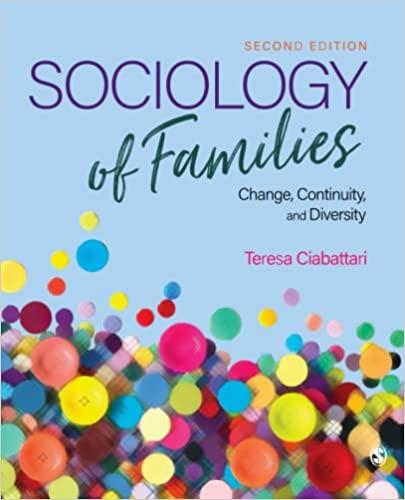Question
In a Colorado case in 2018, the Supreme Court ruled in a favor of a Colorado bakerwho refused to bake a cake to celebrate the
In a Colorado case in 2018, the Supreme Court ruled in a favor of a Colorado bakerwho refused to bake a cake to celebrate the marriage of a same sex couple because of a religious objection. (MasterpieceCakeshopv. Colorado Civil Rights Commission, 2018)Lawyers for the baker argued that forcing him to make a wedding cake for a same-sex couple violated his rights to free speech and the free exercise of religion.The Baker commented, "I didn't want to use my artistic talents to create something that went against my Christian faith," he said in an interview with CNN, noting that he has also declined to make cakes to celebrate Halloween.
In 2019 , the Arizona Supreme Court ruled that the refusal by Christian artiststo create wedding invitation for a gay couple was protected free speech (Brush & Nib v. Phoenix, 2019).The artists, who believe a marriage should be between only a man and woman, had argued that the ordinance would violate their religious beliefs by forcing them to custom-make products for same-sex marriage ceremonies.
Also last year, a Mississippi wedding venue that refused to serve an interracial couple apologized in the face of backlash over its discriminatory policy.The ownerof he venuewascaptured on video explaining that the venue was unwilling to accommodate gay and interracial couples due to their Christian beliefs.
This term, the U.S. Supreme Court is hearing arguments that will determine whether a business may refuse to hire and fire employees based on their sexual orientation andtransgender status (Block v. Clayton Country, GeorgiaandZarda v. Altitude Express).
Please address the following questions in your discussions:
(1)Should a claim of religious freedom under the Constitution justify a refusal by a business to offer service?
(2) As a future business owner, would you refuse to provide services to certain customers?Should you be able to decide who you serve?Is it legal?Is it ethical?
New York Governor Andrew Cuomo, in response to the continuingCovid-19 pandemic,recently signed an executive order authorizing businesses to deny entry to any customer who doesn't wearmask or other face covering. According to Cuomo, the law is meant to protect the rights of store owners to protect themselves and their patrons--"You don't want to wear a mask, fine, but you don't have a right to go into that store if that store owner doesn't want you to."Some customers have claimed that a "mask mandate" infringes on their constitutional rights.
(3)IsCuomo'sexecutive order discriminatory?Is this different than the previous cases where business owners have refused to service to certain customers?
Step by Step Solution
There are 3 Steps involved in it
Step: 1

Get Instant Access to Expert-Tailored Solutions
See step-by-step solutions with expert insights and AI powered tools for academic success
Step: 2

Step: 3

Ace Your Homework with AI
Get the answers you need in no time with our AI-driven, step-by-step assistance
Get Started


